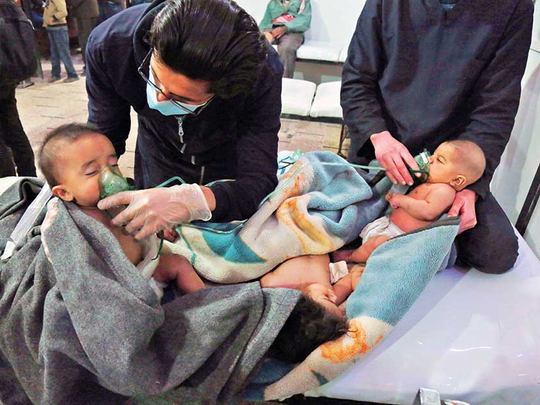
Finally, an international ceasefire resolution was issued to stop the fighting in Syria for 30 days, said the UAE’s Al Khaleej. Despite the horrors of what is happening in Syria, it was not very easy to get the resolution issued prior to closed-door meetings and phone calls between relevant leaders, noted the paper. “Talks held at the UN Security Council concerning what is happening in Ghouta in particular, reflect how complicated the Syrian crisis is, and also the strong international role played in deepening the Syrian wounds, which made it more difficult to reach a political solution for the Syrian crisis. The truth is that what is happening in Eastern Ghouta is just a part of the misery faced by Syrian people in all areas of the country, who have been suffering under the throes of death for seven years now as they turned into victims of the conflict between the Syrian regime and armed groups.”
The Jordan Times wrote that after days and nights of wrangling that left more than 500 people dead and no less than 25,000 injured, the UN Security Council was able to adopt a loosely-worded resolution, which may or may not bring security and safety to the nearly 400,000 inhabitants of Eastern Ghouta.
The wording of the resolution is interesting and full of holes and ambiguities but still brings hope to the people of Eastern Ghouta for a respite from the bombings and air strikes, said the paper.
“The operative paragraph of the resolution ‘demands that all parties cease hostilities without delay’ and states that the duration of the ceasefire is ‘for at least 30 consecutive days throughout Syria’. Yet, the resolution specifically excludes the application of the terms of the ceasefire to Al Qaida and Al Nusra Front. There is no direct mention of the Turkish intervention in Afrin in the north of the country,” the paper said.
Twenty-four hours after the badly-sought ceasefire call, the shelling continues and the dead are piling up under the eyes of a world standing helpless, wrote Lebanon’s Daily Star. “Although the bombing of medical facilities has sparked global outrage, few concrete options have emerged to stop the bloodletting. Humanitarian agencies are sickened that no matter how often they have begged the Security Council to do something, the brutality in Syria has sunk to new lows.
The collusion between the Russians, Syrians and Iranians was never more obvious than when Iran’s army Chief of Staff reiterated Sunday that the Security Council resolution does not cover ‘terrorist groups’ and that therefore Eastern Ghouta would continue to be targeted. How many mothers must lose their children? How many more images do we need to see of fathers holding their dead children before we act?”
For Russia, success in Syria means imposing a political solution according to its perception, noted the London-based Pan-Arab paper Asharq Al Awsat. “The more Moscow fails to impose a solution that suits it, the more it wants to go further in search of a victory that will resolve the battle on the ground. Moscow’s concerns mounted over the past few months, as Washington seemed to abandon the policy of allegiance to the Russian solution and to firmly grip the papers of the Syrian arena.”





_resources1_16a31069e4e_small.jpg)





